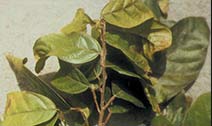Boron deficiency in cocoa

One of the first signs of boron deficiency is profuse chupon formation and the appearance of a few curled leaves which are almost normal green in color. When the deficiency is mild, normal and boron-deficient flushes may alternate. As the deficiency progresses, leaves on the new shoots become very chlorotic and are distorted and twisted. Most of the leaves that are formed under conditions of acute boron deficiency fall before they harden. The leaves that mature become brittle and rough; they remain green but the formation of necrotic patches at the leaf tips is common and is the most typical symptom. Suberization of the veins also occurs.
Profuse flowering on the main stems and branches can be expected and the flower cushions may swell. Ultimately, the terminal buds die as may the axillary shoots which subsequently develop. The growth habit becomes bushy. The trunk and branches may crack and tend to bleed.
Boron is essential for normal flower formation and especially for seed set. Pollen viability and growth of pollen tubes can be reduced by boron deficiency resulting in parthenocarpy and distorted pods; the vascular traces in the pods may become brown and necrotic. Care must be taken to confirm a boron deficiency that is suspected on the basis of pod distortion and to eliminate from consideration the insect Bathycoelia thalassina, which can also cause pod malformation.
Boron deficiency is more readily shown in Amazon cocoa than Amelonado. This may be associated with the more rapid growth and high yields of Amazon cocoa which, being a more shallow feeder, may be more susceptible to drought-induced boron deficiency.